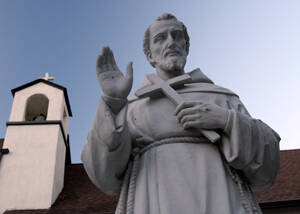It is sometimes felt that Catholics have too little interest in ecumenical questions. On the contrary, the interest is very great. From May 3 to 5, some one hundred and twenty priests, most of them holding responsible positions as theologians, editors and heads of information centers, met, under the auspices of the Friars of the Atonement, to discuss Catholic outlooks on ecumenism. They represented 12 different dioceses and 15 religious orders and congregations.
Three foreign guests came long distances to be present: Msgr. J. F. M. Willebrands, secretary of the Secretariat for Promoting Christian Unity, Rome; Charles Boyer, S.J., superior of a house of postgraduate studies in Rome; and Bernard Leeming, S.J., professor of dogmatic theology at Heythrop College, Oxford.
About fifteen papers were read on different aspects of ecumenical activity. The discussions were pertinent, pointed and sometimes pungent. Upon the following there was general agreement:
The Catholic approach to separated brethren must not be polemic, but must be inspired by the fundamental principles of charity and understanding. There is need of even more general interest in, and, above all, deeper knowledge of the complex questions connected with the reconciliation of divided Christians. Considerable emphasis was laid upon the Church as a mystery, as an object of faith, not merely as custodian of a corpus of doctrine, but also as a life, a means of communion with God and a common sharing of the mystical life of Christ in His body, which is the Church.
Special ground for hope is to be found in the developments going on in the fields of Scripture, liturgy and the apostolate of the laity. The image of the Pope and, consequently, attitudes toward his position in the Church are changing, both among the Orthodox and among Anglicans and Protestants.
More than one speaker noted that, although the absolute number of conversions may seem large, still it is not large enough to change the relative proportions of Catholics and Protestants in the United States, and amounts to no more than about two and a half converts per priest. This does not give great hope that an exclusive attention to individual conversions will solve the problem of Christian disunity. Reconciliation can come only through a variety of efforts, among which the effort at "corporate influence" is not least.
A difference of emphasis revolved around three points about which there is common agreement: First, the whole Catholic faith must be presented to dissidents without even an appearance of attenuation. Second, this must be done in a sympathetic and understanding spirit, with acknowledgment of the elements of the true Church which exist in dissident bodies, e.g., the Orthodox. Third, while dogma is unalterable, there are matters of custom and practice which can change and develop (the laws of the Eucharistic fast are only one example).
There was, among the participants, and there is among Catholic ecumenists generally, some difference in the emphasis to be laid on one or other of these points in dialogue with separated brethren. It is, however, a difference merely of emphasis and in no sense a difference of principle.
Msgr. Willebrands was asked: "How can the coming Council help the ecumenical cause?" His answer was necessarily tentative, because the preparations for the Council are by their nature confidential. He said he felt able, however, to give the following personal reflections:
It would be a serious mistake to imagine that reconciliation with separated brethren—Orthodox, Protestant and Anglican—can come about by negotiation or discussion around a table. None is ready for such an approach. The history of the Council of Florence provides clear lessons in the matter.
The coming Council is primarily to revitalize the internal life of the Catholic Church; nevertheless, in doing this, it could contribute much to the cause of reconciliation. It could indicate what the body of Catholic leaders judges to be the needs today of all Christian people; it could avoid terminology likely to be misunderstood by separated brethren; it could speak in a style which, without the slightest compromise of truth, would rouse resonance and approval in the minds and hearts of all separated brethren; it could make the Secretariat for Promoting Christian Unity into a continuing organ of the Catholic Church. Above all, it could be an impressive manifestation of that unity in diversity which is characteristic of the Catholic Church.
The Secretariat for Promoting Christian Unity, informed by many contacts and much friendly intercourse, of the outlook of separated brethren, can help the Council and its deliberations.
This very brief indication of some topics treated at the conference fails to do justice to the solid value of the meeting, and fails, most conspicuously, to give any account of the valuable papers read, and of the discussions which followed. Most of all, it fails to give sufficient praise to the initiative of the Friars of the Atonement, to their generous and cordial hospitality, and to the founded hopes that this conference may be the forerunner of many others.








